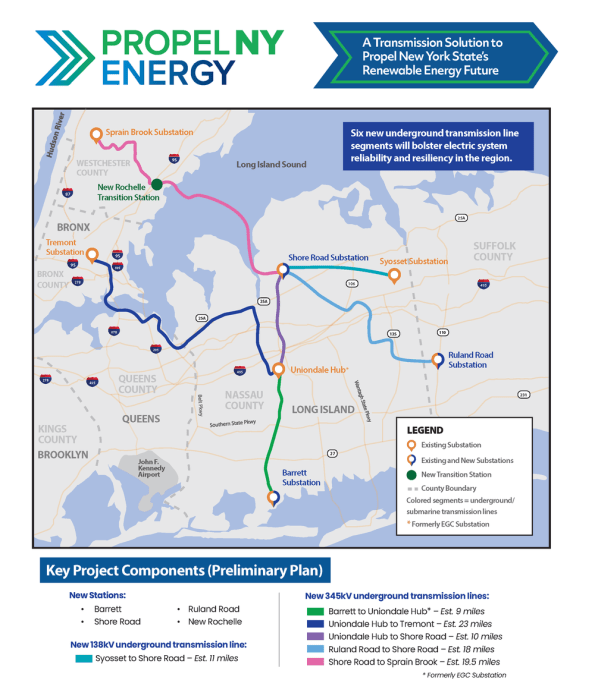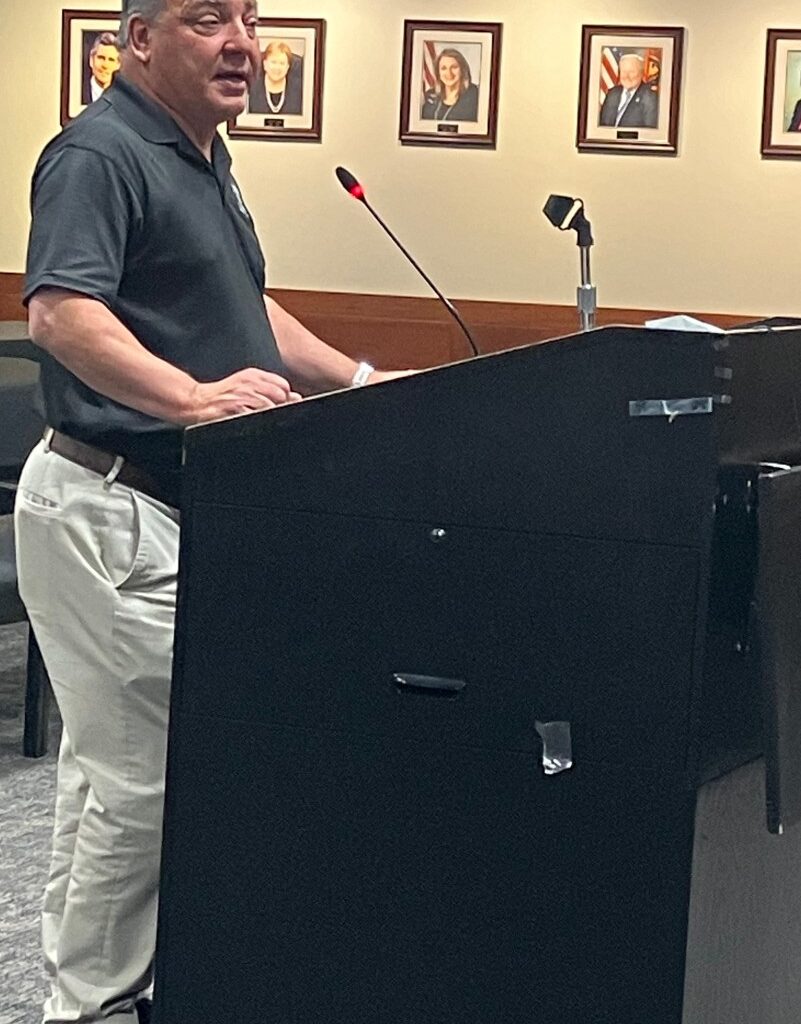Some residents along the path of a new proposed transmission line that would cross Long Island and Queens have found themselves in opposition to environmental groups, electrical and construction unions and developers of the project designed to upgrade the state’s energy grid
“We’re not agreeing to this. So, it needs to go away,” one resident said during a series of public hearings last week. “I think that you should take the word of the residents of the area…I think that it’s OK for the government to say, ‘we made a mistake, and we’re not going to go forward.’”
Others who live near the proposed project, called Propel NY, deemed it a health risk, raised alarm over the impact construction would have on their streets and quality of life, expressed anger that the project could use power from offshore wind, and accused developers of not notifying them properly about their plans.
The public-private project involves the New York Power Authority and New York Transco working together to build a new 90-mile underground transmission line, which carries electricity from where it is generated to homes and businesses. The proposed line, which will run from Queens to Suffolk, is meant to increase the capacity, resilience and reliability of the state’s electric grid and transmission system, which have not been updated in decades. Like current transmission lines in the state’s grid, it will be able to carry any type of power through it, from coal to natural gas to wind energy, based on what is most available and affordable at the moment, a decision made daily by the power operator.
 Propel New York’s proposed transmission lines across Long Island and Queens. Photo courtesy of Propel New York.
Propel New York’s proposed transmission lines across Long Island and Queens. Photo courtesy of Propel New York.
Some of those opposed to the project attended several of the four public hearings held by the New York Public Service Commission across Glen Cove and Mineola to “ensure” their voices were heard. Dozens of people spoke at each, which occasionally became contentious and heated. Those on either side had to be reminded to remain calm and respectful to each other, particularly after those holding the hearing said a fight nearly broke out between two people in Glen Cove.
Those living in and near Glen Cove called their home “ground zero” for the project and its detrimental impact.
“This project will negatively affect the health and welfare of our surrounding communities in so many ways,” said resident Vincent Suraci. “For over a year, a number of North Shore residents, most living there or owning businesses along the route of proposed construction, have voiced opposition to the dangerous Propel New York project. [We] are ground zero for this project. We need to fight this as a community.”
The project has been in the planning and permitting stages for years. If it continues to receive the necessary approvals, it projects it will begin its four-year construction in roughly a year. As the project runs entirely underground, construction will result in streets being temporarily torn up to place the line underneath them.
Both speakers who opposed the project and those who expressed support for it asked the Propel NY team to reconsider certain parts of the route where the line would be laid, and therefore where construction would take place. People specifically asked the team to redraw the construction map so construction would not take place on certain main roadways in Glen Cove, Glen Head and Glenwood Landing, particularly Glen Cove Road, one of the only major north-south thoroughfares running out of the peninsula.
“People will die from longer emergency service response times as our roads will be severely restricted, with our two firehouses being on those roads,” one Glen Cove resident said. Others expressed concerns over increased traffic, noise, disruption and potential for decreased home values.
Adrienne Esposito, director of Citizens Campaign for the Environment, expressed her support for the project, calling it necessary, but also asked the team to work with the Coalition to Protect Hempstead Harbor to ensure any route that involved the harbor did not harm the waterfront and that all possible environmental mitigations were taken.
“The reality is that we have to modernize our energy infrastructure. If we don’t do it now, when are we going to do it? And if we do it in the future, it’s going to cost more. It’s not going to get less inconvenient,” Esposito said. “We must find the right route, but we must proceed with meeting the energy demands of the 21st century with 21st century infrastructure and technology.”
Propel NY representatives said they would be amenable to considering the route change and took the comments seriously, adding that feedback like that was exactly why the public hearing process was critical. Representatives also emphasized that the construction would happen incrementally, so no one roadway would be worked on for the full four-year period.
According to developers, the upgrade to the state’s electric grid is necessary to prevent rolling blackouts and if people are to continue using power on demand without disruption as they are used to. Dmand for power has exponentially increased since the state’s grid was built and climate change-induced storms make the overloaded grid vulnerable to shutting down when it’s most needed.
Pro-environmental organizations also called the project necessary and environmentally friendly during the public hearings, telling developers it would be a critical piece of infrastructure as climate change’s impact on extreme weather events increases.
Representatives from IBEW Local 1049, a union that includes thousands of PSEG LI employees responsible for the island’s power supply, said they support the project because they see the need for the grid upgrade every day while working.
“I have firsthand knowledge. I also worked in the power plants where the power is produced. Everyday, one of my tasks is to make sure that the power is restored to all customers,” one PSEG LI lineman said. “Our system has been overloaded and, in my opinion, underdeveloped, for a while now…It’s a critical infrastructure issue. I see it every day, when people are complaining about how we live in a third world country when the power goes out.”
“My major concern is the future of Long Island. I want to make sure that I live in a place where we have steady power, and make sure that our environmental concerns are addressed, and we can’t do it on the system that we have now. We have to make sure to reinforce it and have a strong system so that when disasters happen, cables fail, equipment fails, that we have that reliability.”
He and other employees said people should not be so concerned about health risks, as he was directly exposed to electrical cables every day and did not experience any issues.
However, residents were not convinced, saying they thought radiation from electromagnetic fields from the line would harm them and their children. Some laughed at union members’ testimonials, accusing them and those speaking from environmental groups of being “paid lobbyists” for the project.
“We just want to be protected. We’ve been toxified before. We’re smarter now. We know better,” one woman said. “I’m not against things that are green. We want safe green. This is our future. This is our kids’ future, also.”
Propel NY representatives emphasized that the project was safe and that the electrical cables, all of which would be placed underground, do not pose any health risks. They have pointed out to those concerned the many other similar underground transmission cables that run through upstate suburbs and New York City that have not caused health issues for those living near them.
Some also accused the developers of not properly informing the public of the project or of giving no notice that it was happening or coming to the area.
“I’m here today to speak on behalf of those residents who remain in the dark, not by choice, but because they have not properly been informed,” resident Matt Papiro said. “How is it possible that something of this magnitude, potentially affecting entire communities, can move forward without proper notification to the public? It’s outrageous. So many community residents that I’ve spoken to are totally unaware of this project. How can this be allowed to proceed without true transparency, proper notice and public awareness?”
Propel NY said it has sent notices to all homes and businesses within the project’s radius and has held multiple in-person and online informational sessions on the project over the past year. Most of these sessions were voluntary, unlike the recent public hearings, which were a required part of the application and permitting process.
The team said it plans to hold additional virtual informational meetings over Zoom in the coming months.
